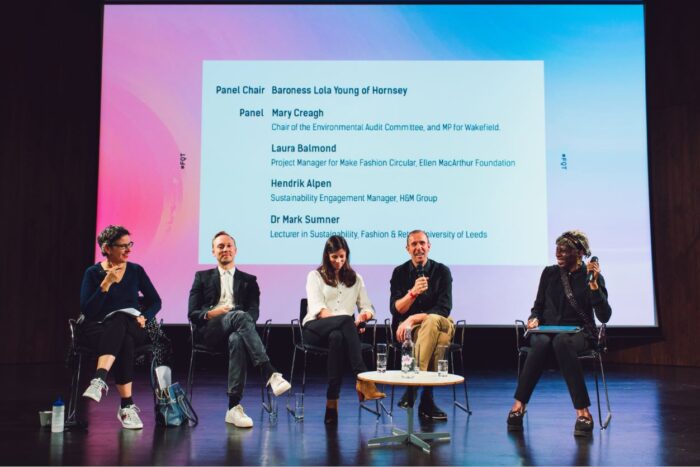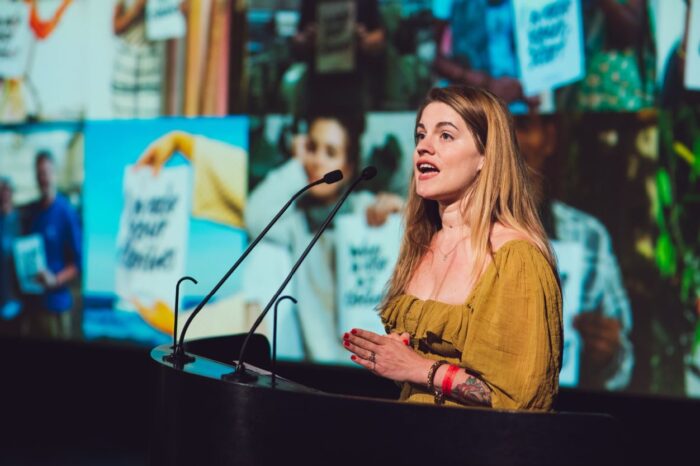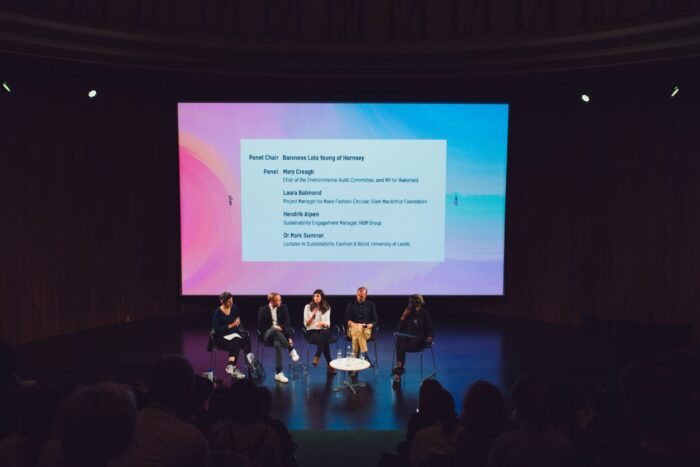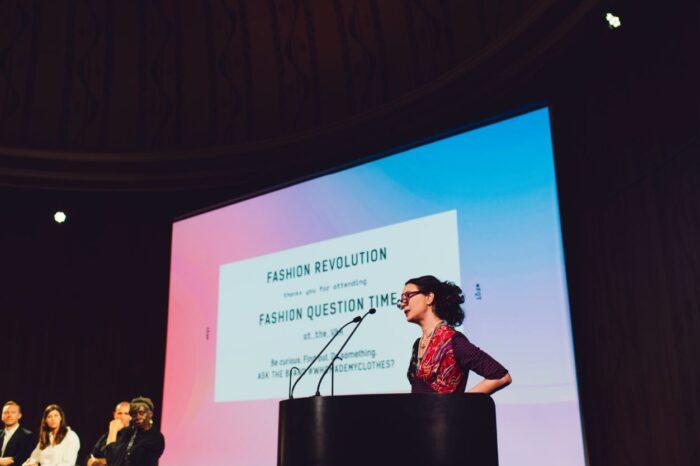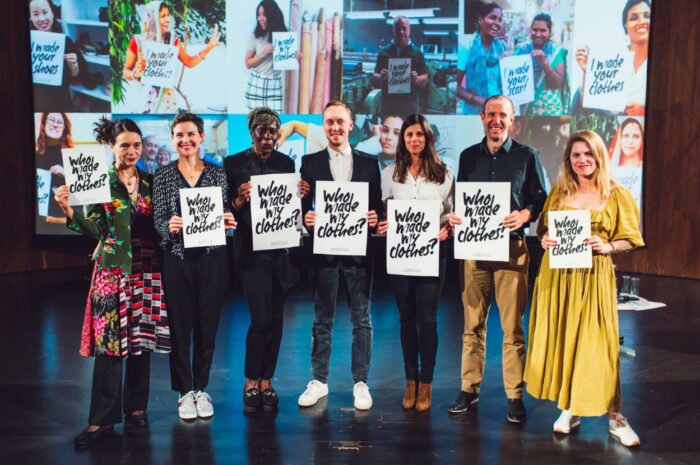MASS CONSUMPTION: THE END OF AN ERA?
On Friday 24th April 2020, Fashion Revolution hosted our sixth annual Fashion Question Time, a powerful platform to debate the future of the fashion industry during Fashion Revolution Week. In light of current COVID-19 measures, Fashion Question Time was hosted in a new digital format.
This year’s theme, “Mass consumption: The end of an era?”, couldn’t feel more relevant to the present situation. Our current crisis has sparked a renewed desire to support each other in a time of uncertainty and is highlighting ways in which our personal habits can become more sustainable. We have been encouraging an end to overconsumption for many years, yet we also know that in the face of this unexpected halt in manufacturing, it is the most vulnerable, lowest paid people in the fashion supply chain that feel the worst effects. So, as we take this time to pause and reflect on our own consumption and disposal patterns, the question of how to support the millions of supply chain workers who have already lost their jobs remains largely unanswered.
MEET THE PANEL
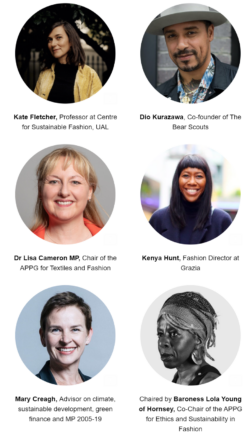
MISSED THE EVENT? WATCH FASHION QUESTION TIME AGAIN HERE:
Below we have selected some questions and answers that were discussed over the debate during Fashion Question Time 2020:
An opening speech was made by Carry Somers, co-founder and Global Operations Director of Fashion Revolution, speaking of her recent voyage in the Pacific researching microplastics, she said:
And there in the middle of the ocean, I confronted the signs and symbols of our consumption, across the pacific seascape. I witnessed the reflection of our age of excess in the surface of the sea, in the trail of plastic waste which has been left in the wake of uncontrolled growth. So our challenge this decade is to move beyond our currently destructive and western world view which is tipping us into a climate catastrophe and a plastic pollution crisis, towards a fashion industry that integrates nature in a truly sustainable way.
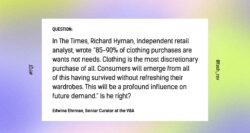
The first question was submitted by Edwina Ehrman, Senior Curator at the V&A, focussed on how clothing demand may change post-COVID.
Kenya Hunt, Fashion Director, Grazia:
We’re already seeing a change in demand and I think that largely boils down to the economy which is in a state of free fall. I read that 75% of consumers in Europe and the States, believe that their personal finances are being negatively impacted by this pandemic. So that alone is, it is impacting demand. On top of that, we were seeing a gradual shift and mindset with consumers in general as awareness spreads of how overconsumption has a negative toll on the planet.
Mary Creagh, Advisor on climate, sustainable development, green finance and MP 2005-19:
I think there’s a radical change coming – we’ve seen collapses in sales. I’m sure China is seeing a boom but that’s because nobody’s bought anything that for three months. So what happens when the sort of pent up demand, the people who want those handbags or want those top items? What happens when they stopped buying those things? They’ve got what they want. What’s clear is there’s a collapse in sales, an absolute collapse.
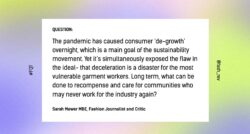
The following question by Sarah Mower MBE explored current reduction in growth and its impacts on garment workers.
Kate Fletcher, Centre for Sustainable Fashion, UAL:
De-growth is not the same as negative growth. And what we’re experiencing at the moment is negative growth. And I think it’s really wholly wrong to assume that what is happening now in the fashion sector in any way gives us a full taste of what will happen if we engage with de-growth ideas fully. So what growth is, is it’s the process of accumulation of capital and wealth. Whereas de-growth by contrast, it’s not an economic concept wholly. It really involves the whole of society. It asks questions about values and representations and it’s about examining consumption of natural resources and energy but within the carrying capacity of the planet.
Dr Lisa Cameron MP and Chair of the APPG for Textiles and Fashion:
There are massive global issues to consider in terms of appropriate wages for those workers internationally and how we’ll attempt to support them in when they are in poverty. There are also issues for the UK in terms of the fashion industry to take forward, which have been thrown into this conversation and we’re looking at trying to address some of those. That might be something that that moves forward progressively as a result [of this pandemic].
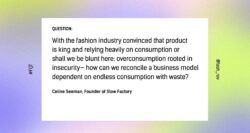
Celine Seeman, Founder of Slow Factory, submitted a thought-provoking question on how we can reconcile the current business model dependent on consumption.
Dio Kurazawa, Cofounder, The Bear Scouts:
This is about capitalism. And I think it’s very key to note that she said that this is rooted in insecurity. Yes. that’s correct. We don’t need to buy all the things that we do buy. But these businesses have been set up in order to perpetuate overconsumption. I think the real answer to this is really innovation. It’s about how things are made. Are they adopting circular methods? The other thing is that brands don’t look at their supply chain as partners. A lot of my manufacturing clients have been left in the dark by Arcadia group, for example, who’s left one of my manufacturers with a bill of around 400,000 pounds in cancelled orders.
Kate Fletcher, Centre for Sustainable Fashion, UAL:
The fashion industry has been set up to make us spend money we don’t have on things we don’t need to impress people we don’t much care about. And so as we’re going forward, it is important for us to, to recognize that the business model that underpins the current fashion sector is based on a logic of economic growth. Other logics and other business models are available. It’s not the only world, we created this and we can create something else. We need business as part of a solution moving forward.
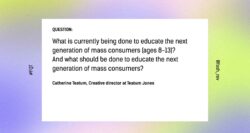
The next question by Catherine Teatum, Creative Director at Teatum Jones, focussed on educating the next generation.
Kate Fletcher, Centre for Sustainable Fashion, UAL:
The education of this group is mainly currently handled by the marketing departments of brands. And this is really shocking, isn’t it? The economic growth focus that’s so prevalent in society means that consumption really isn’t critically considered in schools and across the curriculum. There isn’t a coherent critique of what consumption practices mean in the school curriculum in the UK at all.
Dio Kurazawa, Cofounder, The Bear Scouts:
I think it’s really about coming together and working with a variety of folks who may not be embracing responsible fashion or climate change, but maybe they have the platform that prevails for that demographic. I think we need to work together across industries in order to get this message across.
Mary Creagh, Advisor on climate, sustainable development, green finance and MP 2005-19:
I think this virus is an opportunity for us to sit at home and talk about how we learn and what we learnt. And when we had our inquiry, we had a lecturer from Leeds College of Fashion who said, ‘one of my students said I’m going to have to go and get a new coat because the buttons come off this one’. The fact that you’ve got fashion students, and I’m not saying this is universal but it was anecdotal evidence, that can’t sew on a button. When 20 years earlier, you have 11 year olds that can do blanket stitch and chain stitch. Once you’ve made something and sweated over it for hours, you’re much more likely to throw it out because you actually understand the making and creation that went into it.
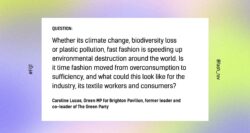
Caroline Lucas, MP for Brighton Pavillion and former leader of the Green Party, asked what a world could look like if we moved away from consumption to a model of sufficiency.
Mary Creagh, Advisor on climate, sustainable development, green finance and MP 2005-19:
How do brands in fashion 2.0 make deeper relationships? They know their staff here in this country. Why can’t they know their staff in Bangladesh, in China? And why can’t they look after them in the way that they look after their workers here? And if you go back to Salts Mill and Salter or Bournville for Cadbury’s, some of those great industrialists realised their workers were living in awful conditions and created model villages for them. I think there’s something there about knowing your workers better.
Dio Kurazawa, Cofounder, The Bear Scouts:
We just now have a new launch of a new innovation that allows you to feel the fabric of a garment just through your mobile phone. So there are a lot of innovations that are out there. The problem is fast fashion won’t pay for it because the model of the fast fashion is built on does not allow for such a thing. It’s based on spending little but having a big margin to sell in order to get a profit. And until that shifts, until you can regulate, at least the businesses within the UK who are going way over to the far East in order to take advantage of these lower prices, then we’re never really going to get anywhere.
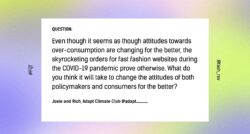
A question from Josie and Rich, Adapt Climate Club, explored how we can change attitudes of consumers and policymakers.
Kenya Hunt, Fashion Director, Grazia:
I work on the B2C side of things, so I’m always speaking to the consumer at the magazine. I think it’s about just really constantly showing them how their habits really impact one’s day to day life. I was talking to the designer Bethany Williams and she was saying that if people knew that when you order multiple sizes and you keep one and you send the others back that they may be burned, that they probably wouldn’t do it. So, I think educating them essentially to the high cost, the very high cost of cheap clothing, should be number one.
Dr Lisa Cameron MP and Chair of the APPG for Textiles and Fashion:
We need to make it more obvious for consumers, perhaps like a traffic light system of green, amber and red in relation to different aspects of manufacturing. There’s some resistance obviously from the industry itself. So, I think it’s going to be a combination of shifting our education for young people to make sure that they understand the global goals, the sustainable development goals, by combining that with some regulation.
Orsola de Castro, co-founder of Fashion Revolution closed Fashion Question Time with a speech:
We will have to look for balance after all this. Let’s ensure this period of restrictions won’t be followed by one of hyper excesses, of business as usual times 10. There are ways to make an adequate amount of products, providing dignified work to the people who make them, while protecting and conserving our environment – we have to invest in them and implement them with rigour. So the call to action from this FQT couldn’t be more simple. Go back to the event’s title: Mass consumption – the end of an era? And the remove the question mark. Mass consumption – the end of an era. FULL STOP.
We are so grateful to Baroness Lola Young of Hornsey for chairing our first *virtual* Fashion Question Time event, and to our brilliant panellists, Mary Creagh, Kenya Hunt, Dr Lisa Cameron MP, Kate Fletcher and Dio Kurazawa. In addition, we would like to thank Edwina Ehrman and the team at the V&A for their continued support despite the circumstances.
Tomorrowland: how innovation and sustainability will change the fashion panorama.
On Wednesday, 24th April 2019, Fashion Revolution hosted our fifth annual Fashion Question Time, a powerful platform to debate the future of the fashion industry during Fashion Revolution Week. This year Fashion Question Time was hosted for the first time at the V&A museum and opening the event up to the public for the first time. The theme this year was Tomorrowland: how innovation and sustainability will change the fashion panorama.
Chaired by Baroness Lola Young of Hornsey, this year’s panel brought together leading figures across government and the fashion industry to discuss the future of the fashion industry.
Attendees included high-level fashion industry representatives from across the sector, global brands, retailers, press, MPs, influencers, and NGOs. Panelists included Mary Creagh, MP and Chair of the Environmental Audit Committee; Laura Balmond, Project Manager, Ellen MacArthur Foundation; Mark Sumner, Lecturer in Sustainability, Fashion & Retail, University of Leeds, and Hendrik Alpen, Sustainability Engagement Manager, H&M Group.
After a welcoming speech from Tim Peeve, an opening speech was made by Sarah Ditty, Policy Director for Fashion Revolution:
“There is an ocean of truth lying undiscovered before us when it comes to the fashion industry of tomorrow. We urgently need to focus on innovation and we need sustainability to be scaled up.”
Below we have selected some questions and answers that were discussed over the 1 hour ½ debate during Fashion Question Time 2019 at the V&A:
Olivia Shaw, Campaign Support Officer for #LoveNotLand
fill and London Waste & Recycling Board asked:
“In a world with finite resources, why does the fashion industry waste around three quarters of what it creates and how are we going change this model to create a fair system for all?”
Laura Balmond, Project Manager, Ellen MacArthur Foundation: It’s not possible to continue as we go on… The amount of clothes produced is rapidly increasing – and we are using clothes 40% less. Less than 1% of materials are going back into fashion we make… We need a huge systemic rethink .. I believe that the circular economy will be business-led. We need businesses to get behind this common vision… The current system doesn’t work. The leaders will continue to push ahead – will the others exist in 5 years time?
Mark Sumner, Lecturer in Sustainability, Fashion & Retail, University of Leeds: Technically there are lots of solutions but there’s no motivation… We have the opportunity to change this and legislation plays an important role. The fashion industry has been around for thousands of years. It plays an important role in self-esteem and identity, plays an important part in our lives. But we can’t stick with the model we have at the moment, we need to change. The Modern Slavery Bill is a good starting point but we need more legislation. More innovative structures in place to penalise businesses – the responsibility needs to be across the whole system.
Mary Creagh, MP and Chair of the Environmental Audit Committee: The current fashion industry model promotes over consumption and under utilisation. My concern is that the policy space in this country, which has historically been a leader on these issues, has been crowded out by the Brexit psychodrama and the space for creative and necessary responses to this is being handed to us. We’re in a unique situation where the public is dragging the Government. We debated the environment twice in Parliament twice yesterday so things are changing but we all need to think about our overconsumption… We also need to strengthen regulation to require greater executive level accountability for tackling modern slavery and reducing greenhouse gas emissions in business and supply chains.
Hendrik Alpen, Sustainability Engagement Manager, H&M Group: Moving to a circular model makes business sense. Right now, H&M operates one of the biggest global take-back schemes.
Sarah Ditty, Fashion Revolution, Policy Director on behalf of Labour behind the Label asked:
The one safety initiative that came out of the Rana Plaza collapse, the Accord on Fire and Building Safety in Bangladesh, is at risk of being expelled from the country at the moment, putting all the progress made in the last six years at risk. At the moment over 50% of the factories still lack adequate fire alarm and detection systems and 40% are still completing structural renovations, these life-saving remediations need to be overseen by the Accord. With the Accord under threat, how can innovations in transparency create a better future for garment workers?
Laura Balmond, Project Manager, Ellen MacArthur Foundation: With innovations around transparency, relies purely on the information that is inputted at the very beginning. So, this then raises the question of how do we verify that and how do we ensure the information you are receiving is correct? Therefore, what are the financial incentives to improve the system? We must incentivise accurate data inputting.
Hendrik Alpen, Sustainability Engagement Manager, H&M Group: The Accord is a very well working mechanism. So, we as a brand, and other brands hope it will continue. Last year 98% of our suppliers were compliant with the Accord’s requirements, and this year, it will be 100% compliance. You talk about incentives, so that’s a sort of incentive we can create to get something back for the work we are investing, besides, you know, it’s the right thing to do. This can also create a level playing field between brands and this is very crucial to make informed choices.
Mary Creagh, MP and Chair of the Environmental Audit Committee:
The real costs of what goes into those clothes are not truly priced. We will only have change if we price clothing based on the material, the labour, and carbon emissions. Those costs are currently passed onto the countries of production… Currently, it’s down to little NGOs to police big brands. Footlocker doesn’t provide an anti-slavery statement on their website, for example… We must make accountants and CEOs accountable for slavery and emissions. Anyone with a pension fund can buy shares in a business, and as a shareholder, you can go to AGMs and to put pressure on these brands.
Sara Arnold of Extinction Rebellion asked:
To have a chance of avoiding the worst effects of the climate and ecological collapse, we must get to net zero carbon by 2025 and halt the loss of biodiversity. The mobilisation we need is unprecedented and as an industry, we should be declaring climate and ecological emergency and acting as so. If this was treated as the emergency that it is, would there be any place for fast fashion? Would there be a place for fashion at all?
Hendrik Alpen, Sustainability Engagement Manager, H&M Group: Obviously, it is hard to say we shouldn’t exist! But I can relate to the thoughts. So, our job is to reduce the impact of what we do. So that’s why we set the goal to be climate positive by 2040, that may be too late, but we are discussing timelines. We have made changes across our stores, and office to be powered by renewable electricity. So, the challenge we have is how do we bring that into the supply chain? And our first goal is to have a climate neutral supply chain by 2030. That’s a huge challenge, we don’t know how to do that, but that’s the challenge we are taking on and we have to take on. Then the question is how can we continue to operate with such a business model which still brings fashion to the people but how do we do that in a better way? Our business model is based on selling products and it still will be for a while and on the other hand, that means jobs for people, joy for people but we need to find a different way.
Laura Balmond, Project Manager, Ellen MacArthur Foundation:
Think of the global population, what do people want, what do people need. Firstly, we need clothes, but then we have a prospect of fashion. Fashion is creative and meets a variety of needs of the people. So you’ve got on the one hand, Instagram bloggers who wear many different outfits and that’s how they’ve learnt to operate. And that’s okay, we don’t want to stifle creativity or fun. At the opposite end of the spectrum, you’ve got the guy that’s had his pair of Levi’s and loves them and doesn’t want them to ever wear out and he’s set for life. So how can the fashion industry rise to the challenge of meeting both these needs and still continue to exist? This can lead to interesting things coming out of this, for instance, an organisation that curates a digital wardrobe, so why do they necessarily need to own clothes at all…This is the end where rental models, swapping will be the way to keep clothes in use for as long as possible, just not with the same person. Then, on the other hand, we need to create well made, durable and repairable clothing. And that’s the challenge for the fashion industry: how can it rise to better meet the needs of the consumers?
Mark Sumner, Lecturer in Sustainability, Fashion & Retail, University of Leeds:
We’ve got 11 years to solve climate change, and I suspect it’s going to be less than that. So I agree, that it’s not fast enough. But I think you need to understand that its systemic part of culture and the part that the fashion industry plays in it. Fashion plays a really important role in our lives, for self-esteem, identity, it’s about projecting our position in society. It a really important part of our lives… I think it’s really interesting when people talk about fast and slow fashion, I go around fabric mills and garment factories, you can see excellent best practice happening in fast fashion supply chain and at the same time, around the corner you see absolutely diabolical conditions in factories supplying to luxury brands, sometimes run by the mafia. So, to think that luxury, fast fashion and slow fashion are different concepts is false. I think what we need to be looking at is brands and retailers that are doing good things, H&M, for example, are trying lots of different models, they haven’t got the answers yet but at least they are trying. Some brands out there don’t even know they have to ask the question about climate change, it’s not on their agenda at all. Those organisations are the ones we really need to metaphorically give them a kick. Different business models need to be developed but that does require significant change, so it’s also about changing the way we behave.
Mary Creagh, MP and Chair of the Environmental Audit Committee:
Thank you [to Extinction Rebellion] for creating the operating space for MP’s like me, who have always been a bit of a lonely voice, to become normalised.
But also, while there is a climate emergency, there’s also a social emergency on hand. And we need to tackle both of these things together. And switching to a low-carbon economy, we have to make it adjust transitionally, we have to make sure we don’t create winners and losers, so that fashion shouldn’t just become something for rich people to enjoy. So, when we look at how we are going to transition, we have got problems with our transport, in agriculture and the way we fuel our homes. So those are the three policy challenges for government. Had we moved from our over-consuming society very quickly, we aren’t going to get to net zero by 2025. The science will tell us what to do to get to net zero by 2050, and then in five years’ time to 2040 and then we’ll aim to get there for 2035. We have wasted the last 10 years, we’ve had no new policy in this country to change behaviour and we’ve done some policy mistakes along the way. I think fashion needs to set out it’s roadmap to net zero. It needs to say how we get to net zero and the target needs to be legally enforceable and not just voluntary.
Dr Mark Sumner, Lecturer in Sustainability, Fashion & Retail, University of Leeds:
This isn’t just about fashion, it’s a culture of consumption. There are brands doing good stuff who are being lambasted by the press and the ones that aren’t doing anything are slipping into the shadows.
Closing Fashion Question Time 2019, Orsola de Castro, co-founder of Fashion Revolution, made a powerful closing speech:
“There is absolutely no excuse anymore. We all have to do what is required of us as people, people working in companies, in governments, in education, in the media, and at home. We have to fight the system and we have to fight our lifestyle. We can’t do this without information and we can’t access verifiable, comparable and understandable information without transparency and public disclosure… We have to move from a culture of exploitation to one of appreciation and place respect for resources and for each other before every deed and every process.”
The other questions asked were:
Antonio Roade, Senior CSR Manager, New Look asked:
Technology will be vital to transition towards a circular economy; and we keep on seeing big companies investing millions collaborating with different research institutions; in different areas and often with no clear outputs. How do we coordinate different initiatives and who should be taking the lead on this (research institutions, governments or brands)?
Elle L, Artist, Expert Advisor in Fashion and Media to United Nations Environment Programme asked:
As we know, fast fashion uses a lot of synthetics which we in the room and the government now know to be highly toxic and damaging to the environment — do you think that a tax can and should be implemented to minimise or how do we phase out the amount of synthetics produced?
Julie Hill, Chair of WRAP asked:
What are the best tools to drive resource efficiency and transparency in the fashion supply chain?
Jennifer Eweh, Designer and Entrepreneur, Eden Diodati asked:
What are the opportunities and challenges involved with automation, blockchain, and artificial intelligence being used within the fashion supply chain?
Siobhan Wilson, Owner, The Fair Shop asked:
Small business and organisations have been driving change in communities across the country and beyond in making, repairing, reinventing and reusing. How can these businesses be nurtured and supported more here in the UK, so they can flourish at a greater scale and gain further exposure to a mainstream fashion audience?
Jasmine Hemsley, Cook, Author and wellness expert, asked:
What will our future look like without sustainable fashion being commonplace?
A very special thank you to the Edwina Ehrman for opening the V&A to Fashion Revolution’s Fashion Question Time and to the rest of the V&A team for your efforts in making this event a success. And a thank you to Sienna Somers and the rest of the Fashion Revolution team for organising this event.
All images Copyright Rachel Manns / www.rachelmanns.com / @rachel_manns / Rachel Manns is an internationally commissioned freelance photographer based in London, UK. She has spent the last decade shooting for a range of clients all over the world. She has a strong passion for sustainability and human rights. With fierce ethical values and a beautiful visual style, Rachel’s work perfectly intertwines the two. Her aim is to use her camera to aid positive change globally, whether that’s politically or commercially, whilst never compromising on aesthetic. Get in contact for rates.
